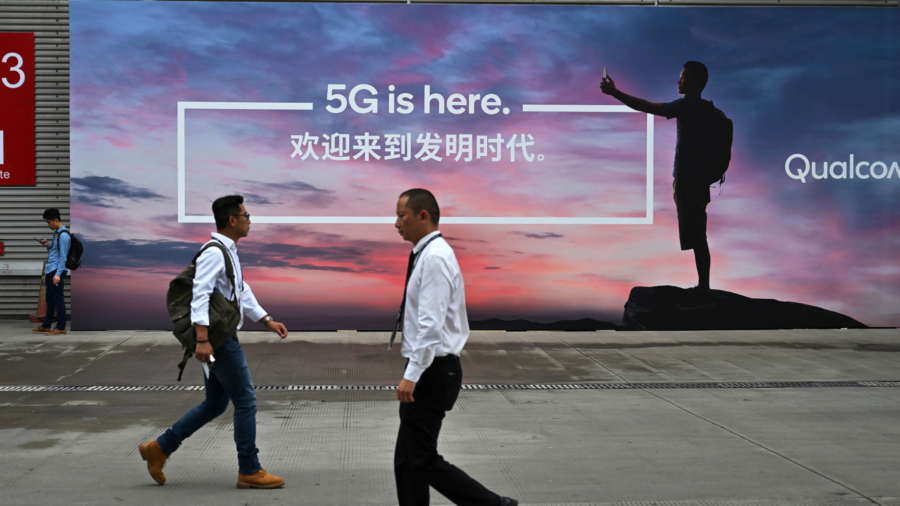China is far ahead of the United States in developing fifth-generation (5G) digital communications technology and by 2025 could have a powerful intelligence window into the information and data that most of the world’s population depends upon in daily life.
That’s the warning of Hudson Institute senior fellow William Schneider Jr. in a Sept. 5 briefing memo made public by the Washington-based conservative think tank.
Schneider is an economist and defense analyst who is a former presidential appointee at the U.S. State Department and the Office of Management and Budget (OMB).
“5G technology will enable a worldwide transition to mobile telecommunication with nearly instantaneous transfer of data,” Schneider wrote in the memo. “Forecasters estimate that by 2025, three-quarters of the world’s population (6 billion people) will be interacting with data an average of once every 18 seconds.
“These interactions will take place through ubiquitously distributed 5G capabilities embedded in everyday appliances through the ‘internet of things’ (IoT), as well as with the data business that governments provide and often control.”
The IoT is the currently forming digital world in which millions of devices from smartphone and microwave ovens to automobile computer controls and “smart cities” are interconnected to exchange and process trillions of data bytes in mere microseconds.
Such capabilities make 5G much more than simply the next step up in digital telecommunications for Wi-Fi systems, as 4G was compared to 3G, according to Schneider. It is the critical link to create the worldwide digital infrastructure required for the IoT.
Schneider estimates that by 2030 the commercial and industrial sectors of the world’s economy alone will have up to 125 billion devices essential to daily life and generating distributed data about their users.
Thus, 5G is “the gateway to control the world’s information infrastructure,” according to Schneider. “The intelligence value of this information from a national security perspective exclusively accessed through a modern communications system dominated by China—5G—is immense and profoundly threatening.”
Experts project that China will deploy an estimated 4.9 million 5G base stations by 2030 while investing another $150 billion in the technology by 2025.
Beijing has heavily invested in 5G research and development for more than a decade, an investment reflected in the fact “a Chinese-dominated infosphere is, in fact, the ‘digital road’ component of its Belt-and-Road-Infrastructure (BRI),” Schneider wrote.
The BRI is Chinese leader Xi Jinping’s signature long-range plan for making China the world’s pre-eminent superpower, in place of the United States.
Making Beijing a major lending source for countries around the world, but especially in developing countries, is a key part of that plan. China already has the world’s largest digital financial services infrastructure serving 800 million people.
In addition, “China is positioned to overtake the U.S. as the world’s largest insurance market—a form of financial service that is readily propagated by modern telecommunications technology, particularly 5G,” Schneider wrote.
“Meanwhile, the broad-based availability of financial services in developing countries [under the BRI] would be a massive transformation” in world balance-of-power relations.
These developments coincide with the advance of technology firms into the financial services sector based on their vast and growing “fintech” digital networking and processing resources, Schneider noted.
With BRI’s 5G capabilities, China could continuously and simultaneously track and analyze billions of individual financial transactions.
U.S.-based technology giant Google is working with Chinese universities and corporations with close ties to the Chinese military and intelligence communities.
The artificial intelligence (AI) applications that result from such collaborations could also enhance China’s ability to analyze vast quantities of financial transactions in Beijing’s emerging “social credit” system.
The social credit system was announced in 2014 and is expected to be completed in its first iteration by next year, according to Forbes. The system consists of a digital file on every individual and corporation in China, and computes a continuously updated individual “score” for all of them.
The score measures how well or poorly each entity complies with the Chinese Communist Party’s behavioral, political, and economic mandates and prohibitions.
“This transactional information is one of the important enablers of China’s social credit system. For example, in areas where non-Han Chinese citizens live (Tibet and the Uyghur regions of Western China), a deficient social credit score prevents millions from buying tickets for public transportation,” according to Schneider.
Schneider further warned that “if China is able to dominate the next generation of telecommunications services through its propagation of 5G, it will underpin its BRI aims to become the world’s leading economic and military power by 2049, the 100th anniversary of the founding of the Peoples’ Republic of China.
“China’s emerging efforts to gain control of the global infosphere by linking it to a global Chinese 5G network are likely to continue,” Schneider wrote. “Recent U.S. legislative initiatives that attempt to develop competitive offerings to China’s infrastructure efforts, including 5G, remain embryonic and untested. The United States is late to the game, and the time to catch up is short.”
From The Epoch Times

